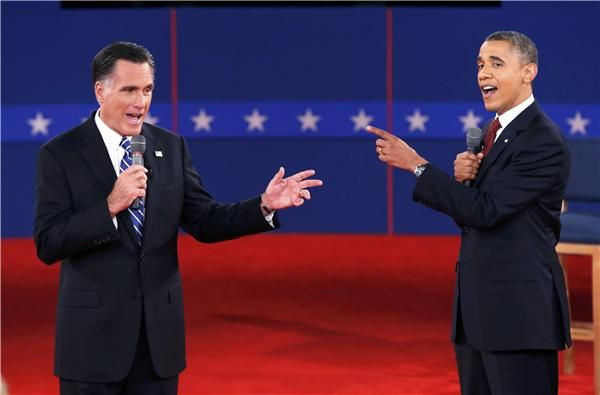Second Presidential Debate 2012 Live Blog

In the interminable slog of a modern presidential campaign, there are few junctures that can legitimately said to be critical. Gaffes generate outrage that dissipates quickly, new policy platforms are unveiled and then ignored, and polls fluctuate constantly.
But the first installment of the 2012 presidential debates has, surprisingly, seemed to alter the dynamics of the race (or at the very least, the media narrative). Prior to the Oct. 3 face-off, Mitt Romney was lagging in national polls and in surveys of nearly all crucial swing-states.
That changed dramatically after the first debate, when Romney put in a performance where he seemed more in command than a listless President Barack Obama (the veracity of some of Romney's claims aside). The Republican nominee has closed some of those polling gaps and generated a fresh wave of enthusiasm for a campaign that was widely criticized as incompetent and aimless.
So the stakes are extremely high going into the second round, a town hall-style event at Hofstra University on Long Island. Obama will need to appear more forceful without seeming condescending, while Romney will need to overcome a history of incumbent presidents stumbling in the first debate before recovering in the second one.
A big variable here is the moderating. Jim Lehrer was widely faulted for being too passive in the first debate, allowing the candidates to dictate the tone and topic of the conversation without asking adequate followups or pressing for details. Martha Raddatz did better in the vice presidential iteration, asking pointed questions and pushing back on initial responses.
A document leaked to Time reveals that the campaigns have agreed to "ground rules" designed to effectively remove moderator Candy Crowley from the equation. Here's a sample:
“In managing the two-minute comment periods, the moderator will not rephrase the question or open a new topic." In addition, "the moderator will not ask follow-up questions or comment on either the questions asked by the audience or the answers of the candidates during the debate or otherwise intervene in the debate except to acknowledge the questioners from the audience or enforce the time limits, and invite candidate comments during the two-minute response period.”
That, combined with the fact that the questions to be posed by audience members are prescreened, could remove an element of unpredictability from the debate. But Crowley -- who was not a party to the "rules" -- has suggested she will disregard the accord and ask some followups, and the town hall format tends to lend itself to questions about a broader range of issues.
Therefore, hot-button topics that were glaringly absent from the first presidential debate -- from immigration to reproductive rights and women's health to same-sex marriage -- could surface.
Either way, the International Business Times will be following the proceedings, offering insight and analysis throughout. Stay here for coverage of the debate, and feel free to weigh in with comments and questions.
© Copyright IBTimes 2024. All rights reserved.











